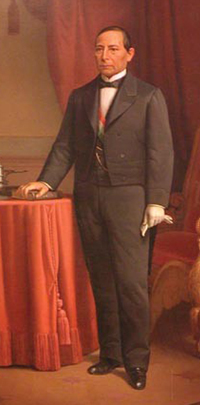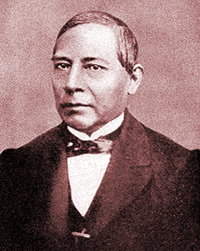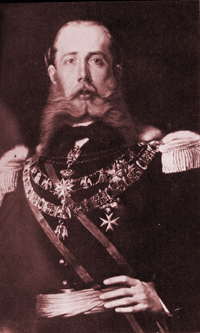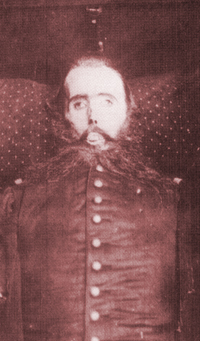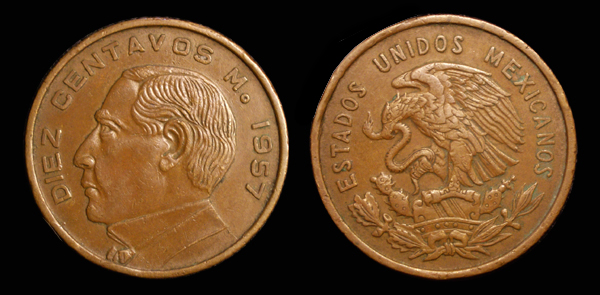
10 CENTAVOS COIN - MEXICO - BENITO PABLO JUAREZ GARCIA
(KM 433)
Date: A.D. 1957
Obverse: Portrait facing left - DIEZ CENTAVOS M.1957
Reverse: Coat of Arms (eagle with snake and cactus) under legend - ESTADOS UNIDOS MEXICANOS (United Mexican States)
Archduke Maximilian of Austria and Emperor of Mexico
The body of Maximilian on display after his execution |
This is a bronze 10 centavos coin depicting Benito Juárez, five term president of Mexico and one of that nations most highly regarded leaders. Benito Juárez was born at San Pablo Guelatao, Oaxaca, Mexico, on March 21, 1806. His parents died when he was very young so he lived with relatives in the Zapotec Indian village where he was born. When he was twelve he moved to the city of Oaxaca to live with a sister. He was illiterate and spoke only his native Zapotec tongue, he sought education, employment, and a better life in general. He found a patron in the form of local catholic businessman Don Antonio Salanueva who aided him as he attended the Santa Cruz Seminary. With the help of the Church he learned to read, write, and speak Spanish in preparation for a life as a priest. After his graduation in 1827, he decided instead to study Law at the Instituto de Ciencias y Artes. In 1831 he was able to practice law but instead chose to go into politics. With a liberal reformist agenda he became a member of the Oaxaca Town Council and then a Congressional Representative in 1833. At this time he still practiced law but it was mostly in defense of indigenous communities. In 1842 he served as a judge and from there he served as the Governor of Oaxaca from 1847 to 1853. As Governor, Juárez continued to push a liberal reformist agenda. He sought to maintain a balanced economy and carried out numerous public works such as new roads, schools, and public buildings. In 1853 the Conservative party, led by Lucas Alamán and working with General Antonio Lopez de Santa Ana, seized power. Many liberals, including Juárez, were expelled from Mexico. Juárez spent his exile in New Orleans working various odd jobs to make a living. In 1855 the liberals took power and Benito Juárez returned from his exile to serve as the Minister of Justice. He then served as Chief Justice of the Mexican Supreme Court and Vice-President of Mexico in 1857 under the moderate president Ignacio Comonfort. He helped to institute a series of reforms to be included in the new constitution and issued the 'Law on the Administration of Justice and the Organic Law on the Tribunals of the Nation, of Districts and of Territories' (the Juárez Law). He sought to abolish the privileges enjoyed by the military and by members of the clergy. The conservatives revolted and Juárez was imprisoned but escaped to lead the liberal side of what would be called the 'Reform Wars.' In July 1859, with the support of the liberals, he issued the Reform Laws which declared the independence of the State from the Church, laws for civil marriages and registration, and the transferal of church property to the nation. In January 1861 Liberal forces took Mexico city and Benito Juárez became the President of Mexico under the constitution of 1857. Juárez was at the head of a bankrupt state. In hopes it would buy time to heal the fractured economy, he suspend payment on all foreign debts for a two year period prompting action from European nations such as England, Spain, and France looking to protect their business interests in a faltering nation. England and Spain retreated when it became apparent that France, under Napoleon III, would be taking advantage of Mexico's weakened state with plans of conquest. France invaded Mexico with the help of Mexican Conservative forces in 1862. After fierce resistance they captured Mexico City in June 1863 placing the Archduke Maximilian of Austria on the Mexican throne of the new Mexican Empire. Maximilian was first approached by Mexican monarchists with a proposal to become the Emperor of Mexico in 1859, an offer he refused. After the French invasion, under pressure from Napoleon III and after General Élie-Frédéric Forey's capture of Mexico City, he consented to accept the crown in 1863. His decision involved the loss of all his noble rights in Austria, though he was not informed of this until just before he left. With everything to lose he took the throne as the Emperor of Mexico and set to the task of pacifying resistance to his rule one way or the other. Juárez was offered a position in the new empire but he refused to accept the rule of Maximilian. The new emperor then tried another tactic, he killed anyone that might be involved with the resistance on sight. Juárez and his government were forced to retreat to Ciudad where he continued to lead the resistance to the Maximilian government and continued to run his government in exile. After four years of continued resistance, growing pressure from America acting under the Monroe Doctrine and aiding the resistance with arms, the cost in men and money, the refusal of many nations to recognize Maximilian's rule, and politics in Europe, it became apparent that the New Empire would not last and the French occupational forces began to withdraw. Though urged to abandon Mexico by Napoleon III himself, Maximilian refused to desert his new empire. Withdrawing in February 1867 to Querétaro, he sustained a siege for several weeks. The city fell on May 15, 1867 and Maximilian was captured and sentenced to death with his generals Miguel Miramón and Tomás Mejía. Many prominent figures of the day sought to reverse the sentence urging Juárez to spare Maximilian's life. Juárez refused to commute the sentence, believing that it was necessary to send a message that Mexico would not tolerate any government imposed by foreign powers. Maximilian was executed by firing squad on June 19, 1867. His body was embalmed and displayed in Mexico before being entombed in Vienna, Austria, the following year. Juárez was again elected president. Now at the head of a government under a constitution which guaranteed free speech, free press, right of assembly, and the abolishment of special legal privileges, Juárez sought to reform Mexico and build its infrastructure. The government built railroads and schools, the military budget was cut, and he continued to strip the Church of it privileges and its large landholdings. There was still heavy resistance to his reforms, even within his own party. Juárez found it difficult to trust others enough to delegate power and was accused of conducting himself more as a dictator than a president. In fact he was facing growing division and opposition in the liberal party as well as personal problems in the form of a stroke in October of 1870 and the death of his wife in 1871. He won the controversial presidential elections in 1871 where he is accused of using his powers to suppress opposition. He died of a heart attack while working at his desk on July 18, 1872. He was succeeded by Sebastián Lerdo de Tejada, his foreign minister. Juárez is considered by many as one of the greatest Mexican leaders in that country's history as he fought for reform, a fair constitution, and refused to bow down to foreign subjugation, instead fighting for the freedom of his nation. Although he fell well short of his stated goals of equality, greater rights, and prosperity to the poor and rural working classes, he is remembered as a reformer and a Mexican patriot. With high ideals he was a driving force in the establishment of Mexico as a constitutional democracy, in the building of infrastructure, as a champion for equal rights for the indigenous population and the poor, a champion for better education, and lessening the political and financial power of the Roman Catholic church in his country. |

